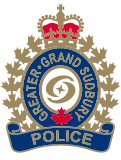
If this is an emergency, please call 9-1-1
Human trafficking is a criminal offence that involves the exploitation of a person through force, coercion, threat, fraud or deception, for the financial gain of the exploiter.
It's important to note that sex work and Human Trafficking are distinctively different. Generally when a person engages in sex work, they make the choice to do so. Sex workers keep the money earned and can decide to exit if they choose.
Domestic Sex Trafficking, on the other hand, occurs when a person controls, manipulates and intimidates another person into providing sexual services where the money earned goes back to the trafficker.
To file your report online, we require the following:
- You must have a valid email address.
- You must complete the contact address information.
Once you've completed your report, you will:
- See the words “Your online police report has been submitted” which means that your report is complete.
- Be given a temporary police report number.
- Be able to print a copy of your report to keep for your records.
Please note the following when filing a Human Trafficking report online:
- All online reports will be reviewed within 48-hours.
- Once your report has been processed, you will receive an official police report number by email.
- Once your report is reviewed, a Detective will contact you.
If you wish to remain anonymous, please contact Crime Stoppers at 1-800-222-8477 or submit an online tip via the Canadian Human Trafficking Hotline or by calling 1-833-900-1010
The Canadian Human Trafficking Hotline offers a confidential, multilingual service, operating 24/7/365 to connect victims and survivors of forced prostitution and forced labour with social services and/or law enforcement in communities across Canada.
File a Human Trafficking Report
| How are victims recruited? |
|
Victims are often recruited through social media apps (i.e. Instagram, Facebook, Snapchat), fake job offers (modelling, acting), word of mouth, bars and clubs, restaurants, parties, malls and many other public places. In many cases, the trafficker will compliment the victim (i.e. “you are the most beautiful girl I've ever seen”); buy them expensive gifts; take them to parties; give them a lot of loving attention and initiate a sort of romantic relationship with the victim. |
| Know the signs |
|
Human Trafficking and Intimate Partner Violence Toolkit for Survivors
Guiding Our Path - Together We Heal Toolkit
The Guiding Our Path - Together We Heal Toolkit was created through Trauma-informed Indigenous Prevention and Support (TIIPS) Project funded by the Government of Ontario and led by the Greater Sudbury Police Service in partnership with Shkagamik-Kwe Health Centre and N’Swakamok Native Friendship Centre.
This toolkit was developed with the help of our community partners including Shkagamik-Kwe Health Centre, N’Swakamok Native Friendship Centre, Sudbury and Area Victim Services, Atikameksheng Anishnawbek Restorative Justice, the Indigenous Advisory Committee and those with lived-experience.
We recognize that we serve a unique area that is home to a large urban Indigenous population, with 10 First Nations communities within the surrounding area. In addition, Greater Sudbury is a central location between Northern and Southern Ontario, making it a major hub and transit route for Human Trafficking (HT) movement and recruitment. With this in mind, the need to provide awareness, education, intervention, culturally inclusive survivor support, safety planning & outreach, enhanced service and justice equity have been identified within our community. Part of this work includes the development and offering of this guide to our community in hopes that the information will support potential victims and survivors and help in the healing of those who are at risk of or have been affected by this exploitation and violence.
Support Services
If you or someone you know has been or is being trafficked there are various community programs and services to help survivors heal, rebuild their lives and regain independence. Visit the Canadian Human Trafficking Hotline website to access a national directory of social services and educational/awareness materials available.
Learn more about Ontario's Strategy to End Human Trafficking.
Locally, you can speak confidentially with Sudbury and Area Victim Services (SAVS) at 705-522-6970.
| Project Empower |
|
From April 2018 to March 2019, the Greater Sudbury Police Service entered into 56 new human trafficking investigations, resulting in 53 human trafficking related charges laid. During the same time period, 28 Survivors were assisted and referred for relevant and appropriate support services. Given the prevalent risk of human trafficking in Greater Sudbury, the GSPS has identified a need for providing education and awareness to high school youth on human trafficking. To that end, in partnership with Sudbury & Area Victim Services (SAVS), a high school human trafficking initiative was implemented. From the end of September 2019 to date, the GSPS has engaged with over 850 high school students and delivered 16 presentations with SAVS in regard to human trafficking prevention. In 2020, from January to June, 38 Human Trafficking and related occurrences have been investigated, some of which are ongoing. In April 2020, GSPS launched Project Empower, which is a program designed to be a Survivor-centered initiative incorporating crime prevention, education and increased awareness of reporting processes towards sexual violence, harassment and human trafficking. It will feature a multi-agency collaborative approach to helping survivors and potential victims of sexual violence and human trafficking. Project Empower will feature the three priorities of expanding education, providing enhanced training and conducting coordinated community engagement. In keeping with Canada’s 2019-2024 National Strategy to Combat Human Trafficking, this project will coordinate the pillars of prevention, partnerships and Survivor empowerment to combat human trafficking through a survivor-centered, survivor-informed and gender-responsive lens. |
 I Want To
I Want To





 Subscribe to this page
Subscribe to this page